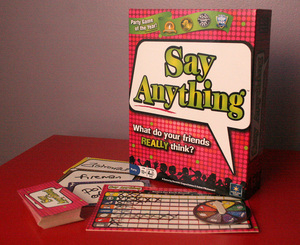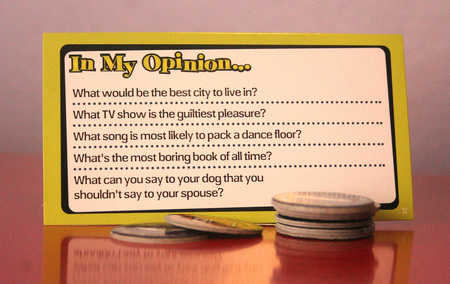Say Anything: a good party game but only with the right group

Mike Hulsebus | Contributor
If there’s one type of “game” that I don’t like, it’s “getting to know you” games. Don’t get me wrong: I’m not against social games, but what I don’t like are games where the game is essentially facilitating a directed conversation. Normally I am not fooled by lists of conversation starters that get turned into games, but I’m here to tell you today: I was fooled and bought Say Anything.
Say Anything, fortunately, is not like those other games. For one thing, when you are done playing, there is a winner. Say Anything is like a combination of Wits and Wagers and Apples to Apples. Each turn, a player will get to choose a question (e.g. “What is the most overrated band of all time” or “I just wrote a book, what is its title?”) and then the other players write down an answer that they think that player will pick. The game has a great scoring system and good questions, but is that enough to get me to like the game? Let’s look at the game in more depth to see.
But before we do that, I want you to understand how a normal “get to know your friends” game plays. Enter LifeStories, a game that I have never played and never want to. In LifeStories, each time you take a turn, you land on a space that asks you to tell a story. “Tell about a time where you saw the importance of family” it might say. And then you do that and your turn is done. It’s basically a roll and move game with an added story-telling element that has nothing to do with the game. And, even worse, it doesn’t matter the order you finish in. Did you finish first? Well your piece can wait at the end and wait for everyone else to finish. Boring.
Good news though: Say Anything is not a boring game.

Mike Hulsebus | Contributor
Let’s play a sample round, shall we? I pick up a card that will have five questions on it and I choose to read one of them aloud. Let’s say I had a card with, “What is the best TV show theme song of all time?” All of the other players write down things that they think I might pick. Let’s say I’m presented with the options of: "Pokemon," "Firefly," "Cheers," and "Gilligan’s Island."
Players, if they so choose, can lobby for their answer, but I’m not supposed to give any indication of the person who I think had the best answer. Once I’ve come to a decision, I use the provided the Select-O-Matic 5000 to secretly mark which answer I think is the best answer. I can choose to try and be objective and pick something like "Cheers," perhaps thinking that that might be the answer that the U.S. as a whole would pick of the given options, or I can pick correctly and pick "Firefly." I then hide my selection so that no one can see it.
Each player gets two selection markers that they place on whichever answers they think that I might pick. They can put them all on one or they can spread them across two answers. When I reveal my answer, the person who authored that answer earns a point and then every marker on that answer also earns its player a point. I also earn 1 point per marker on the answer I chose up to a max of 3 points (the maximum existing to give the question asker incentive to not give away what he’s going to pick). Then it’s the next player’s turn. The game ends when everyone has asked a question; the person with the most points is the winner.
For me, the open-endedness makes this game hard but interesting. For example, I ask the question “What is the worst job?” Answer that, but remember, you want to write an answer good enough so that your answer will be picked over all the other answers. So “septic tank cleaner” probably won’t win since everyone else might put gross jobs. You could try something that’s somewhat specific to that person. Were they perhaps once employed in a horrible fiberglass factory (which, by the way, I just learned about a friend)? That could be a good answer. But then again can you think of a worse job in general? Or how about something funnier? Is the asker going to judge the questions objectively or answer them based on his opinion?
The game has no time limit whatsoever that you have to answer in, so it’s really easy to freeze up trying to think what the best thing to write could be. I myself would like the game more if there were some parameters in which you had to answer (like how, for example, in Apples to Apples you have only the cards in your hand to pick from) but for other people, the open-endedness is going to be what makes this game.
I played Say Anything with a group of 7 and the consensus was that the game was fun but not as fun as other games that we could play instead. Unlike my favorite party games (Wits and Wagers, Time’s Up), I think this is one that really has to be played with the right group.
When making games like Say Anything, Northstar Games tries to ask “What is something fun to do and what are the simplest rules, most engaging rules we could make so that you can get right to that fun and that there is no downtime for players?” This game’s element would seem to be “seeing how well you know your friends” and for me, that’s not something that appeals to me as a game. If this sounds like a game that appeals to you, by all means, go for it. If you have a group of people that likes to sit around and discussion these kind of questions, I think you’ll have a lot of fun playing the game. The questions are really great questions and I think you could play this for years and not get tired of the questions.
I do think that Say Anything is the best ask-each-other questions game out there. That being said, I can’t anticipate ever wanting to play it again over the other great large group options that I have. The question cards are great and my wife and I will probably go through them just for fun to see if we can guess what the other person would say, but beyond that, I can’t anticipate wanting to pull this out.
One final thing that cannot go unsaid. Why does this game have the tagline “Find out what your friends really think.” Have I long suspected that my friends have been lying to me when they say that U2 is an overrated band? Are they likely to confess while we are playing a game if they’ve kept it in this long?
Mike Hulsebus is running out of colorful walls in his condo to photograph his board games against. He can be reached at mikehulsebus@gmail.com


Comments
Mike Hulsebus
Tue, Oct 12, 2010 : 1:36 p.m.
I appreciate the comment and I think it's great that the game has found other uses. Still, that isn't the sort of game experience that I'm looking for when I go to pull out a game.
Todd
Tue, Sep 21, 2010 : 11:23 a.m.
As the publisher of the game LifeStories I felt I needed to comment on how the game was described in your article. LifeStories is a considered a communication style board game. This is a segment not always based on winning or loosing, but rather getting to know others who you may have known forever or met just recently. Communication games like "LifeStories" are used not only at home but in counseling offices, Therapy Practices and a wide range of other areas where effective communication is needed. I am not sure what makes someone an expert on a game they say they have never played. This is also a game that has and continues to be published and manufactured in Michigan....a state where we need to promote our products instead of bashing ones we know nothing about. Mr. Hulebus, if you would like to come and learn more about this game or the people who have jobs selling and making it please feel free to contact me. I also want to mention that I am familiar with "Say Anything" and I would recommend it as a great game.